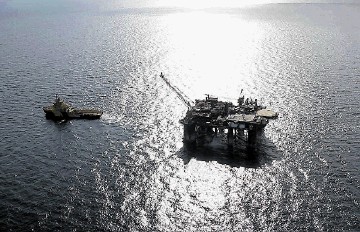
North Sea operator Ithaca Energy has this morning revealed it made a loss of $54million last year.
A reduction in UK tax rates was partly to blame for the shortfall, according to the firm.
Despite the dip, chief executive Les Thomas remained optimistic citing Stella field’s start-up in the central North Sea and a four-fold increase in share price.
He also gave his full backing to the cash takeover bid by Israeli conglomerate Delek Group, proposed earlier this year.
Thomas said: “Our 2016 financial results reflect a year of good progress for the company culminating in first oil from the Stella field in February 2017. This progress has been reflected in the near four-fold increase in our share price since the start of last year.
“Stella first oil was an important milestone for the Company and production is forecast to ramp-up upon completion of ongoing dynamic commissioning of the gas processing facilities.
“Having reached this important milestone and after weighing up the potential risks and opportunities that lie ahead, the board considers the takeover offer tabled by Delek as providing full value to shareholders and wholeheartedly recommends its acceptance.”
The firm managed to reduce its costs of taking a barrel out of the ground from 2015’s $31boe to $23boe.
The loss after tax of $54million was an improvement on the $121million pound loss incurred in a turbulent 2015. Net debt was also reduced from $665million at the start of 2016 to $598million by year end.
A refinancing of the company’s debt facilities is anticipated later this year.
Ithaca’s production last year averaged 9,310 barrels of oil equivalent per day, ahead of the forecasted 9,000 boepd.
The business has a 54.66% working interest in the Greater Stella gas/condensate field. The development is located in the Central Graben area on the UK side of the North Sea.
It started up in February, with production to date of approximately 1,700 barrels of oil per day net to Ithaca.
Proved and probable reserves, as independently evaluated by Sproule1, increased to 76 MMboe thanks to the acquisitions of the Vorlich and Austen licences.
Development drilling at the Harrier field is also expected to be completed this year, with production starting up in Q2 of 2018.
More follows. Check back for regular updates.
Recommended for you
